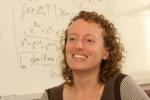
Tamar Ziegler
- Born inIsrael
- Studied inIsrael
- Lives inIsrael
Interview
From EWM Newsletter n°23 (2013/2)
Tamar Ziegler obtained her PhD in 2003 from the Hebrew University in Jerusalem. She worked for several years in the United States, first at Ohio State University, then at the Institute for Advanced Study in Princeton and the University of Michigan. In 2007 she was appointed as a senior lecturer at Technion (Israel Institute of Technology), spent last year as a visiting professor at Stanford, and is now a full professor at Technion. She is currently on leave from Technion and is a professor at the Hebrew University. She has been awarded several honours and prizes, including the Erdős Prize in Mathematics in 2011 and the EMS lecturer of the year in 2013. Part of the duties associated to this EMS position were the series of three lectures delivered to the EWM general meeting. Her current research interests are in structures related to the phenomenon of multiple recurrence in ergodic theory and applications of ergodic theory to combinatorical number theory.
EWM: What does it take, in your opinion, for a person to become a successful researcher in Mathematics?
TZ: It is hard to say, but includes a good education, hard work, persistence, luck.
EWM: How much time does it take you on average to develop an idea into a full publication, in parallel with your other duties?
TZ: It really depends on the paper – it can take anything between a few months to a few years.
EWM: Women mathematicians may tend sometimes to quit following an academic track, for various reasons. Have you ever thought of quitting?
TZ: I thought of quitting several times. First time was during my PhD – I just had my second child, my spouse had made great progress on his PhD and it was clear that he was going to finish within a year or so, and I felt that my PhD was going nowhere. But then shortly after the end of my maternity leave I had a breakthrough. I played with the idea of quitting several other times throughout my career. I was lucky to have very supportive spouse and parents, and they never let me consider it seriously.
EWM: During the lecture series given at the EWM meeting in Bonn, the interest of the audience was aroused partly by the dynamic and convincing style of your presentations. Do you have some tips for young mathematicians for giving a good talk?
TZ: It is very tempting to direct the talk to the few experts in your field, since it is them you wish to impress, but then you lose everybody else. I still make this mistake sometimes. It is also very important not to go overtime – even if what you are saying is very interesting, people lose patience. I usually write down the entire talk beforehand – the number of pages gives me a very good estimate for how long it will take. For general audience talks, my general guideline is that my talk is in the way between the audience and their cafe and croissant. My best advice for these talks is to prepare the talk well in advance and to let someone not from your field look at it beforehand.
EWM: We would like to know about your family, how do you manage as a very busy mother?
TZ: Many times I feel that I don’t. The most difficult thing is to find long stretches of time when you don’t need to worry about the kids. What works well for me is that my spouse and I split the week into “responsibility days”. If it’s your day then you are responsible for all kid issues – if one of the kids is sick, forgot his lunch, etc., you need to take care of it and you don’t bother your partner. On my free days I come back late and those days are guaranteed to be full working days.
EWM: What did you enjoy most at the EWM meeting in Bonn?
TZ: There were some very good talks. It was great to see that there are many young women in Europe doing high quality Math. The EWM offered help with funding child care during the conference to one of the participants who brought her infant child with her – I think this is a great initiative, and perhaps other granting agencies will follow and include childcare as a recognized conference expense.
EWM: Do you find some time for hobbies?
TZ: No time for serious hobbies, but I do have time to do stuff I like – running on the beach, going on family hikes, reading, listening to music. Come to think of it – math is a serious hobby of mine and I get to do it a lot.
